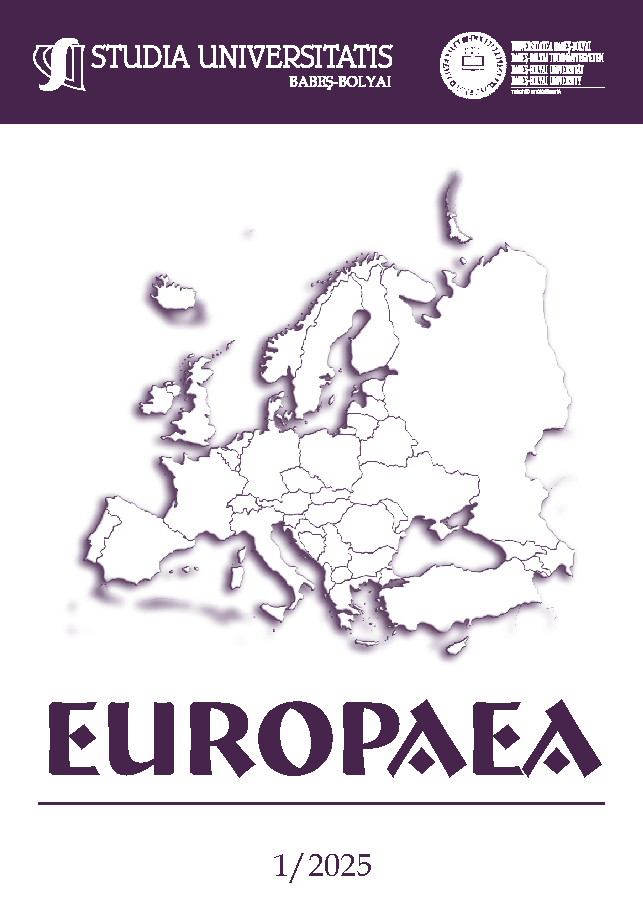Unveiling A New Identity Under the Umbrella of Chinese in the Political Conflict
DOI:
https://doi.org/10.24193/subbeuropaea.2025.1.07Keywords:
constructivism, identity, China, Hong Kong, conflictAbstract
This paper argues that the conflict between China and Hong Kong is not a simple political dispute but is fundamentally tied to the emergence of a new identity within Hong Kong under the umbrella of Chinese identity. The Umbrella Movement in 2014 and the 2019 Extradition Bill movement further highlight the rise of a distinct Hong Kong identity, an identity constructed under the lens of a constructivist and defined by its set of politics, unique culture, and democratic values influenced by British colonialism. In contrast, Chinese identity is understood through a primordialism lens, emphasizing common ancestry and national harmony, interpreted as submission to autocracy. This paper will argue how value incompatibility in both identities is the root cause of this political conflict.
References
1. Barr, Michael D. (2008), “Confucianism, from Above and Below”, in Jeffrey Haynes, ed., Routledge Handbook of Religion and Politics, Routledge, 76-146.
2. Barrett, Martyn (1996), “English Children’s Acquisition of a European Identity”, in Glynis L. Breakwell and Evanthia Lyons (eds.), Changing European Identities: Social Psychological Analysis of Social Change, Oxford: Butterworth-Heinemann, 349-369.
3. Bauer, Robert S. (2018), “Cantonese as Written Language in Hong Kong”, Global Chinese, vol. 4, no. 1, 103-142.
4. Bayar, Murat (2009), “Reconsidering Primordialism: An Alternative Approach to the Study of Ethnicity”, Ethnic and Racial Studies, no. 9, vol. 32, 1639-1657.
5. Berghe, Pierre L. van den (1981), The Ethnic Phenomenon, New York: Bloomsbury Publishing.
6. Bettinson, Gary (2020) “Yesterday Once More: Hong Kong-China Coproductions and the Myth of Mainlandization”, Journal of Chinese Cinemas, vol. 14, no. 1, 16-31.
7. Brubaker, Rogers (2006), Ethnicity without Groups, Cambridge: Harvard University Press.
8. Brubaker, Rogers (2010), “Ethnicity without Groups”, in Montserrat Guibernau and John Rex (eds.), The Ethnicity Reader: Nationalism, Multiculturalism and Migration, Cambridge: Polity Press, 33-45.
9. Economist Intelligence Unit (2018), Democracy Index 2018: Me Too? Political Participation, Protest and Democracy, https://enperspectiva.uy/wp-content/uploads/2019/01/Democracy_Index_2018.pdf.
10. Hong Kong Census and Statistics Department (2021), 2021 Population Census: Use of Language by Hong Kong Population 2021, 2.
11. Hong Kong Free Press (2019), “Hongkongers Identifying as Chinese at Record Low, Only 10% of Youth Proud to Be Citizens –Poll”, https://hongkongfp.com/2019/06/28/hongkongers-identifying-chinese-record-low-10-youth-proud-citizens-poll/.
12. Horowitz, David L. (1985), Ethnic Groups in Conflict, Berkeley: University of California Press.
13. Liu, Juliana (2017), “BBC Cantonese vs. Mandarin: When Language Meets Politics in Hong Kong”, BBC News, https://www.bbc.com/zhongwen/trad/chinese-news-40439847.
14. Ministry of Education of the People's Republic of China (2017), “Circular on the Issuance of the Guidelines on Moral Education in Primary and Secondary Schools’’, https://www.gov.cn/gongbao/content/2018/content_5254319.htm.
15. Ortmann, Stephan (2016), “The Lack of Sovereignty, the Umbrella Movement, and Democratisation in Hong Kong”, Asia Pacific Law Review, vol. 24, no. 2, 108-122.
16. Skeldon, Ronald (1994), Reluctant Exiles? Migration from Hong Kong and the New Overseas Chinese, Hong Kong: Hong Kong University Press.
17. Slomp, Gabriella (2006), “On Sovereignty”, in Darren Zook (ed.), Introduction to Peace and Conflict Studies, San Diego: Cognella Inc., 33-44.
18. So, Alvin (1997), “The Tiananmen Incident, Patten’s Electoral Reforms, and the Origins of Contested Democracy in Hong Kong”, in M. Chan (ed.), Hong Kong’s Reintegration with China: Transformation and Challenge, Hong Kong: University of Hong Kong Press, 49-83.
19. The Hong Kong Legal Hub (2024), One Country, Two Systems and the Basic Law, https://www.legalhub.gov.hk/details.php?a=10&v=-one-country-two-systems-and-the-basic-law#.
20. Wright, Sue; Kelly-Holmes, Helen (1997), “One Country, Two Systems, Three Languages: A Survey of Changing Language Use in Hong Kong”, Current Issues in Language and Society, vol. 3, no. 2, 3-4.
21. Yip, Anastasia (2015), “Hong Kong and China: One Country, Two Systems, Two Identities”, Global Societies Journal, vol. 3, 20–29.
Downloads
Published
How to Cite
Issue
Section
License
Copyright (c) 2025 Studia Universitatis Babeș-Bolyai Studia Europaea

This work is licensed under a Creative Commons Attribution-NonCommercial-NoDerivatives 4.0 International License.



